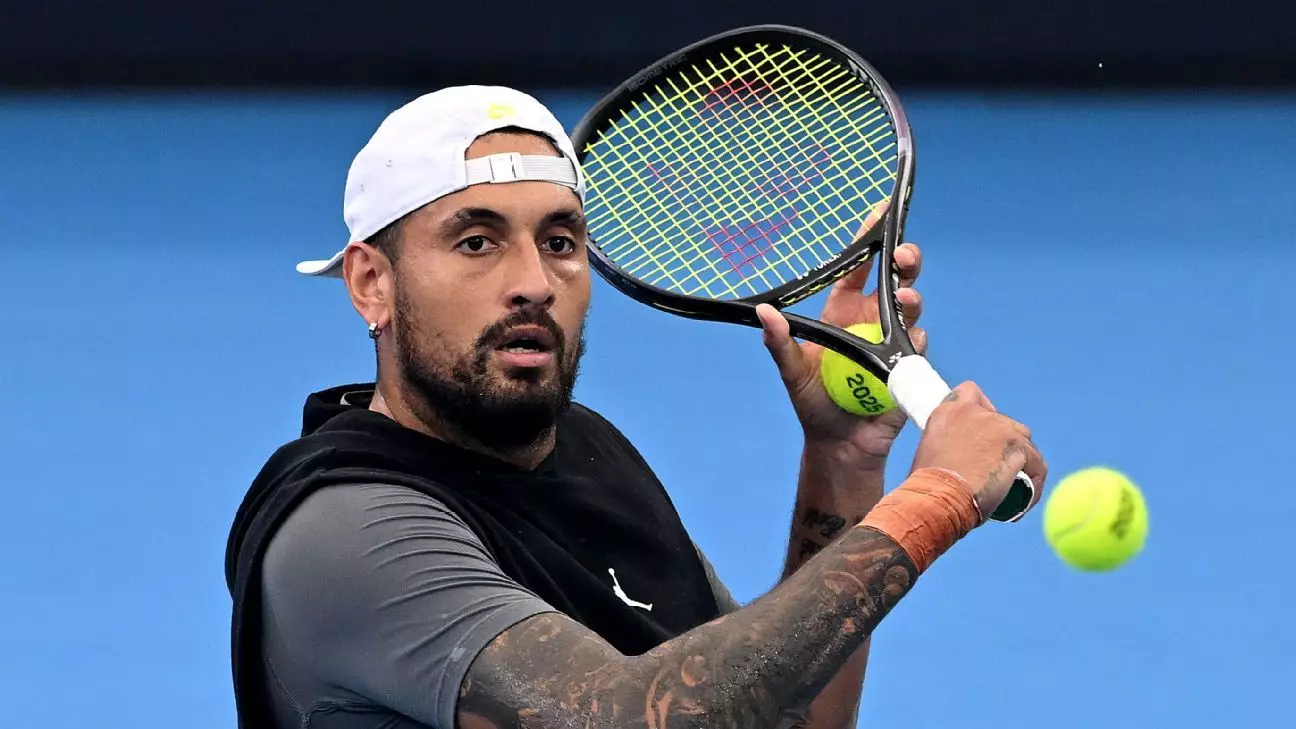Nick Kyrgios, the Australian tennis player, is undoubtedly one of the most contentious figures in the sport today. His flamboyant style, both on and off the court, has sparked passionate opinions among fans, players, and analysts alike. Supporters see him as a breath of fresh air in a world of robotic athletes, while detractors criticize his antics as detrimental to the sport’s integrity. Interestingly, this duality works to tennis’s advantage; Kyrgios’s presence invites intrigue and heightens fan engagement. He recently shared his thoughts on his upcoming return to the Australian Open, emphasizing the essential role of “personalities” in sports. He believes that the element of unpredictability is what truly captivates fans, stating, “We watch sport because we want personalities … It’s like drama, theater.”
Kyrgios’s talent cannot be overlooked; however, concerns surrounding his physical condition are ever-present. After grappling with knee and wrist injuries, many are left wondering if he can compete effectively. He indicated optimism about his fitness during a practice session but remains cautious. “It’s good to be back. I think it’s important,” he remarked, capturing the sentiment that his presence adds excitement. His return is eagerly anticipated not just by his loyal following but also by those who revel in the drama he brings to the game. As the Australian Open approaches, it becomes crucial to monitor his health and readiness, as Kyrgios’s charisma alone cannot carry him through a rigorous tournament.
Kyrgios’s unpredictable nature is one of his defining characteristics. Matches involving him are rarely monotonous; they are filled with spectacular serves, jaw-dropping shots, and frequent clashes with officials or spectators. Whether he’s smashing rackets or making headlines for comments regarding doping allegations, he keeps the spotlight on himself. His candidness often comes with controversy, such as his previous legal troubles or his outspoken criticism of fellow players. Commenting on the complexities of public perception, he noted, “I know that people don’t like when I just speak out about things, and [am] honest about things.” This relentless honesty may polarize opinions, but it undeniably fuels conversation around tennis.
A Catalyst for Change in Tennis
It’s intriguing to consider how Kyrgios’s unique character serves as a catalyst for change within professional tennis. As he prepares for his first Grand Slam in over two years, he has the opportunity to reinvigorate the sport. “I think the sport was getting a bit mundane,” he stated, underscoring his belief that revival is necessary. Daniil Medvedev, a three-time Australian Open finalist, echoed these sentiments, remarking that a fit Kyrgios would be “definitely great for tennis.” Such endorsements highlight the value of Kyrgios’s talent and magnetism, which can rekindle excitement among both players and fans alike.
Looking ahead, the implications of Kyrgios’s performance at the Australian Open could extend far beyond mere match outcomes. His potential success or failure in Melbourne could influence fan engagement, media attention, and even the perceptions of upcoming young athletes. The enduring excitement surrounding Kyrgios emphasizes a broader philosophy within sports: the necessity of charismatic figures who can elevate the game beyond a series of matches. As players like Carlos Alcaraz and Jannik Sinner gain recognition, it remains vital for the sport to balance their rise with the narrative driven by personalities like Kyrgios.
Nick Kyrgios’s return to the circuit continues to be one of anticipation and uncertainty. His ability to influence the landscape of tennis—both for better and worse—serves as a reminder that the sport is not merely about competition; it is about stories, personalities, and the electrifying unpredictability that makes tennis a truly captivating spectacle. Whether viewed as a hero or a rogue, Kyrgios undeniably plays a pivotal role in the ongoing dialogue surrounding the sport.


Leave a Reply